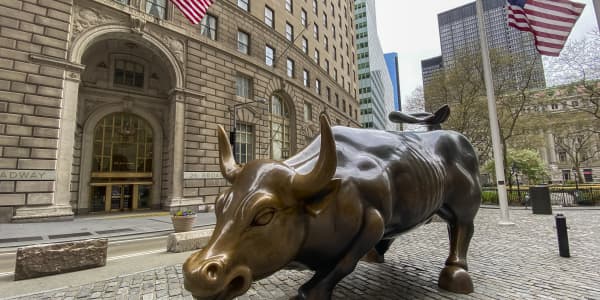This report is from today's CNBC Daily Open, our new, international markets newsletter. CNBC Daily Open brings investors up to speed on everything they need to know, no matter where they are. Like what you see? You can subscribe here.
What you need to know today
- Former President Donald Trump was charged with 34 felony counts of falsifying business records in connection with a scheme that directed hush money payments to two women before he ran for office in 2016. Read the indictment against him here, and the details of his payments to porn star Stormy Daniels and Playboy model Karen McDougal.
- New Zealand's central bank delivered a surprise rate hike of 50 basis points to 5.25%, the highest level since 2008. Asia stocks were mixed after Wall Street's Dow Jones Industrial Average and the S&P 500 snapped a four-day winning streak on renewed recession fears. Job openings in the U.S. tumbled below 10 million in February for the first time in nearly two years, a sign the Federal Reserve's rate hikes may be dampening the once-hot labor market. Industrial stocks fell more than 2%, weighing down the S&P in Tuesday's session on Wall Street.
- JPMorgan Chase CEO Jamie Dimon wrote in his annual letter to shareholders that the banking crisis is not over, saying that "even when it is behind us, there will be repercussions from it for years to come." JPMorgan and other big banks stepped in to make $30 billion of deposits at First Republic, a regional lender that investors worried would follow the collapse of Silicon Valley Bank and Signature Bank.
- Amazon laid off more than 100 employees in its video games division. Those cuts came after Amazon CEO Andy Jassy said last month that the company would lay off an additional 9,000 employees – on top of the previous job cuts, which totaled more than 18,000 people. The company has frozen hiring in its workforce and shut down some experimental projects, such as telehealth service and a sidewalk delivery robot.
- PRO As soft economic data rolls in, traders are preparing for a slowing economy by buying gold — and selling this industrial stock.
The bottom line
Good morning from Singapore. We're seeing more signs that the U.S. economy is indeed slowing down following nine straight Federal Reserve rate hikes. The U.S. central bank has been targeting the red-hot labor market as it tries to bring down inflation, which peaked at a 41-year high last year.
A shrinking number of job openings isn't the only indicator that slower growth is ahead. Fewer people are inclined to quit their jobs. People quit when they're confident about their ability to switch jobs – and that figure rose by only 146,000 to just over 4 million.
And we're seeing companies such as Virgin Orbit filing for Chapter 11 bankruptcy in the United States after failing get more funding. The firm laid off nearly all its workforce. Amazon is piling on layoffs beyond the massive job cuts it already announced this year.
The message from JPMorgan's Jamie Dimon is anything but comforting – though he says the recent banking crisis is "nothing like what occurred during the 2008 global financial crisis," he emphasized that the worst is still ahead.
"Any crisis that damages Americans' trust in their banks damages all banks," he said – calling on regulators to keep better taps on banks' risk management.
But real question is: Will the Fed keep going? Cleveland Fed President Loretta Mester said in a speech in New York that the rate target will need to exceed 5% – echoing Fed officials' determination to bring inflation down further.
The U.S. Labor Department will release fresh nonfarm payroll numbers for March this week. The street's expectation is that unemployment holds steady at 3.6%. If the job market proves more resilient than that, the Federal Reserve has room to hike even further.
New Zealand surprised markets with a bigger-than-expected rate hike of 50 basis points. The Kiwi strengthened nearly 1% against the dollar after the move. That move contrasts with Australia's central bank, which took a breather on rate hikes yesterday, saying it needs to further assess the effect tightening is having on its economy.
Subscribe here to get this report sent directly to your inbox each morning before markets open.





